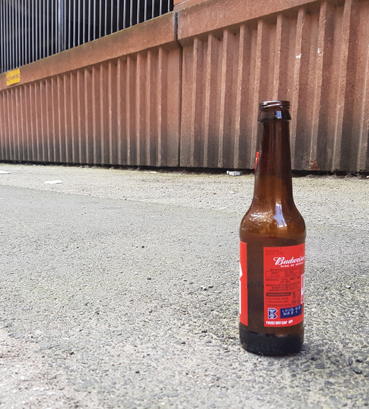Offenders in south Wales who commit alcohol-related crimes can now be ordered to wear a sobriety tag to ensure that they are complying with an alcohol ban. Such tags monitor the offenders’ sweat every 30 minutes and will alert the probation service if alcohol is consumed.
It follows pilots in London boroughs as long ago as the mid-2010s; and then North Yorkshire, Humberside and Lincolnshire; termed Alcohol Abstinence and Monitoring Requirement (AAMR). A further roll-out is planned.
The aim; to reduce re-offending where alcohol is the cause. Courts will be able to order offenders to wear a tag for up to 120 days. According to the Ministry of Justice, the tag can tell apart alcohol-based products, such as hand sanitiser, that could be tried to mask alcohol drinking; and can detect when contact between the skin and the tag has been blocked.
Police and Crime Commissioner (PCC) for Gwent, Jeff Cuthbert, said: “Anything that will help to reduce alcohol-related crime is welcome and this new tool will certainly be useful in some cases. However, it is far more important that we tackle the underlying issues and root causes of alcohol-related crime.
“Since 2014 my office has invested more than £800,000 a year into the Gwent Drug and Alcohol Service to deliver support to offenders where drug and alcohol misuse are the cause of their behaviour. This high level of investment demonstrates how seriously we take the problem, and how committed we are to being part of the solution.
“Support workers are based within the custody suites at Ystrad Mynach and Newport police stations, and also within Newport Magistrates Court. This allows us to offer offenders the support they need at the earliest opportunity.
“By addressing the alcohol issues, and in many cases working with mental health professionals to examine their underlying causes, we are offering people an alternative pathway in life and preventing crime within communities.”
Background
Last month the Commission on Alcohol Harm published a report on the evidence on alcohol harm, trends in alcohol harm and the changes needed to reduce that harm caused. One of those on the Commission was Hardyal Dhindsa, Police and Crime Commissioner for Derbyshire, and Lead for Alcohol and Substance Misuse, for the Association of Police and Crime Commissioners (APCC).
He said: “Alcohol related harm is a significant concern for elected Police and Crime Commissioners across England and Wales and an issue which we have unanimously prioritised in our Police and Crime Plans. Given the estimated costs of alcohol-related crime of £11.4 billion, and the growing risk of people turning to alcohol as a result of the significant pressures arising from the Covid-19 pandemic, the need for co-ordinated national action and a new alcohol strategy has never been stronger.”
Public Health England estimates the total social and economic cost of alcohol-related harm, including crime, at £21.5 billion a year.










